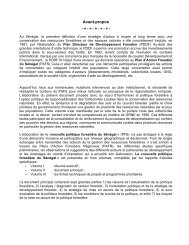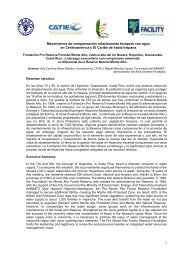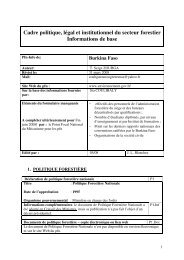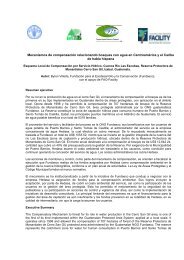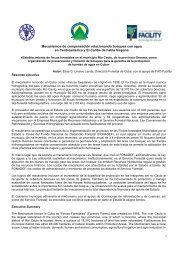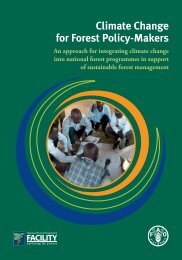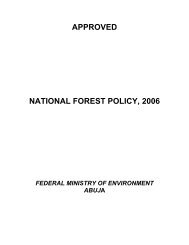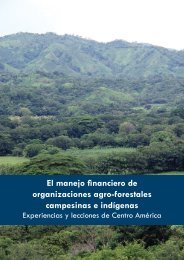2010 Progress Report â Draft - NFP Facility
2010 Progress Report â Draft - NFP Facility
2010 Progress Report â Draft - NFP Facility
Create successful ePaper yourself
Turn your PDF publications into a flip-book with our unique Google optimized e-Paper software.
<strong>2010</strong> <strong>Progress</strong> <strong>Report</strong>forestry stakeholders are invited (government and non-government), and between 25 and 50 people usuallyparticipate. Based on the discussions and the assessment of the nfp (matrix) by the stakeholders, priorityactions are identified, a workplan drafted, and the Terms of Reference for the call for proposals established.Enhancing participationFAO and the <strong>Facility</strong> have continued to strengthen capacities of countries, by providing tools and practicalmethods which government and non-government stakeholders can use to ensure the participation of a widernumber of stakeholder groups and institutions in forestry decision-making and implementation of forest policies.The benefits from the Training of Trainers on “enhancing participation” conducted in 2009 in Africa were realisedin <strong>2010</strong> when the trainers (based in the Region) were utilised to meet country requests for capacity building onthe subject. In this way the following African countries have received training on enhancing participation in nfps:Zambia (April), Lesotho (May), Malawi (June), Gambia (July), Uganda (July) and Liberia (November).In response to the needs of the Latin American region, FAO and the <strong>Facility</strong> conducted a training course for staffof CATIE, as a starting point for them to later offer the training to countries in the Region. To support thetraining of trainers efforts, a trainers’ manual, complete with an accompanying CD, was produced and translatedinto French and Spanish.Conflict ManagementA similar strategy was applied for the module on “collaborative conflict management”, where a partnership wasdeveloped with RECOFTC (Regional institution based in Thailand) to jointly work with FAO and the <strong>Facility</strong> indeveloping and delivering a Training of Trainers module for participants in SE Asia. This phased training involved5 countries, including China, Vietnam, Cambodia, Philippines and Thailand.The training was articulated into 4 phases:1st Phase: Pre-course assignment2nd Phase: Training of Trainers workshop (March-April <strong>2010</strong>)3rd Phase: National level training (June to September <strong>2010</strong>)4th Phase: Lesson learning workshop (November <strong>2010</strong>)The course involved participants in a process of ongoing critical reflection, allowing them to link the coursecontents with their own experiences, and apply conflict management techniques and training methods to theirspecific contexts. Selected key-trainers participated in order to develop and facilitate high quality training, donein a participatory manner, so as to effectively address conflict management in nfps. Local, national andinternational agencies, NGOs and governments that are actively working on conflict mitigation, managementand transformation processes and/or are substantially involved in training were invited to nominate suitablestaff members for participation in the course.The trainers, have since then organised training activities on collaborative conflict management, includingmediation and negotiation techniques in China (October), Vietnam, Cambodia, the Philippines (September) andThailand (November).Increased awareness by countries about the existence of these capacity building modules has heightened thedemand for them, consequently FAO and the <strong>Facility</strong> will continue to engage with the trained trainers in theregion to respond to needs, as more innovative approaches are being developed to ensure a further deepeningand spread of skills at decentralised levels within countries.Support to Smallholder Forest Producers AssociationsFAO and the <strong>Facility</strong> have been approached by Agricord (European coordinating body set up by farmer andfarmers’ organisations and the agricultural agencies of Belgium, Finland, France, the Netherlands and Sweden)to participate in the “Smallholder Forest Producer Associations (SFPA) Development Fund”. Partners andstakeholders in the SFPA Development Fund include: AgriCord, FAO, the Finnish Central Union of AgriculturalProducers and Forestry Owners (MTK) and the Federation of Swedish Family Forest Owners (LRF); and financialsupport is provided by the Finnish and Swedish governments.The general objective of the SFPA Development Fund is to support the establishment and functioning ofsmallholder farmer organizations in the forestry sector, both in timber and non-timber forest products in17



